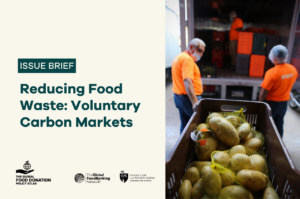Harvard Law School Food Law and Policy Clinic and The Teaching Kitchen Collaborative publish a report identifying policy opportunities to meaningfully incorporate nutrition education into physician education and training programs.
FOR IMMEDIATE RELEASE: Boston, MA (June 13, 2024) – The leading cause of death in the United States is poor diet, yet most doctors are not equipped with the education and training necessary to provide nutrition advice to their patients. Most medical students receive fewer than 20 hours of nutrition education and doctors in most residency and fellowship programs are not required to demonstrate any nutrition-specific competencies that would allow them to provide their patients with actionable advice about healthy eating. A new report published this week by Harvard Law School’s Food Law and Policy Clinic (FLPC) and the Teaching Kitchen Collaborative provides options for policy makers in government and medical education to ensure physicians receive this necessary training.
In Doctoring Our Diet II: Nutrition Education for Physicians is Overdue, an update to FLPC’s initial report, Doctoring Our Diet: Policy Tools to Include Nutrition in U.S. Medical Training, on the same topic published in 2019, Harvard’s FLPC highlights several positive steps the federal government and others have taken towards increasing nutrition education for healthcare providers over the last few years and identifies opportunities to build on this momentum. From enactment of a Congressional Resolution in the U.S. House of Representatives to the historic White House Conference on Hunger, Nutrition, and Health, policymakers are increasingly understanding the need for doctors to receive nutrition education so they can provide science-based nutrition advice and referrals to dieticians and other relevant services. Patients understandably rely on their healthcare providers for this information, but few doctors are qualified to provide it because nutrition is rarely taught in medical education.
Every year, 1.5 million Americans die from diet-related disease and in 2020, healthcare costs accounted for close to 20 percent of the U.S. gross domestic product. Approximately one-fourth of the $1.5 trillion the federal government spent on healthcare in 2018 was for three diet-related diseases—cardiovascular disease, diabetes, and certain cancers. Through Medicare, the federal government pays more than $16 billion for medical residency programs each year. As the report makes clear, “The irony of Medicare funding, however, is that the same pot of funding paying for Medicare patients – the majority of whom suffer from diseases caused by or exacerbated by diet – is also used to pay for the education of physicians who learn little about nutrition.”
“After we published the first version of this report, Doctoring Our Diet: Policy Tools to Include Nutrition in U.S. Medical Training, in 2019, we were blown away at the positive response and the steps taken by Congress, the medical education community, and other stakeholders to make progress on this issue,” said Emily Broad Leib, Director, Food Law and Policy Clinic & the Center for Health Law and Policy Innovation at the Harvard Law School. “However, despite those initial steps, nutrition education is still largely missing from medical school and residency/fellowship training programs, so doctors are ill-equipped to help their patients. As a result, public health will continue to suffer until we meaningfully integrate nutrition education into physician training, and this report lays out some of the most promising next steps to do just that.”
“We must imagine a future in which all medical trainees and practicing physicians are formally trained in, and required to demonstrate competencies in, advising patients about healthier food choices,” Dr. David Eisenberg, Founder and Senior Advisor of Teaching Kitchen Collaborative, said. “Not just advice about micronutrients and nutritional deficiencies, but rather, how to make smarter food choices, in practical terms, to improve human health and the health of the planet. This report masterfully describes a vision of that future.” Eisenberg is also the Director of Culinary Nutrition, Department of Nutrition, Harvard T.H. Chan School of Public Health.
According to Dr. Stephen Devries, cardiologist and co-leader of the Harvard-based Nutrition Education Working Group, “Nutrition education remains sadly deficient in medical training, and we reap what we sow — health care focused on expensive pharmaceutical solutions and missed opportunities to deliver better health at lower cost. This update of Doctoring Our Diet is a masterclass in why the gap in medical nutrition education matters to every American. Furthermore, it offers a framework of strategic policy levers to ensure that clinicians receive meaningful nutrition education that equips them to deliver the health care we all need and deserve.”
The report identifies several strategies to meaningfully increase nutrition education for physicians throughout the different phases of their training and education:
- In medical school, amend the accreditation standards to include nutrition competencies in both the classroom and clinical settings, and provide government grants to support more innovation in nutrition education.
- In residency and fellowship programs, amend the accreditation standards to include nutrition competencies, and make government funding for residency programs contingent upon meaningfully incorporating education on nutrition.
- After physician training, add a requirement for nutrition-focused continuing medical education requirement in states with ongoing licensure requirements; at the federal level, require such continuing education of federally-employed physicians.
As the healthcare system benefits from rapidly growing efforts to increase access to Food is Medicine initiatives, as well as new interventions like GLP-1 drugs, it is imperative that physicians be equipped with basic nutrition education so they can help their patients navigate these treatment options, along with providing basic nutrition advice to patients who are interested in eating a healthier diet.
ABOUT THE HARVARD LAW SCHOOL FOOD LAW AND POLICY CLINIC
Since 2010, the Harvard Law School Food Law and Policy Clinic (FLPC) is committed to advancing a cross-sector, multi-disciplinary and inclusive approach to its work, building partnerships with academic institutions, government agencies, non-profit organizations, private sector actors, and civil society with expertise in public health, the environment, and the economy. FLPC’s work focuses on increasing access to nutritious foods, addressing the climate-related impacts of food and agricultural systems, reducing waste of healthy, wholesome food, and promoting food system justice.
ABOUT THE TEACHING KITCHEN COLLABORATIVE
The Teaching Kitchen Collaborative is a network of thought-leading organizations using teaching kitchen facilities as catalysts of enhanced personal and public health across medical, community, school, and corporate settings. For more information, visit www.teachingkitchens.org.


Health Law & Policy, Commentary
Freezing the Freeze: An Update on Litigation Challenging Trump’s Funding Freeze – HCIM
March 27, 2025